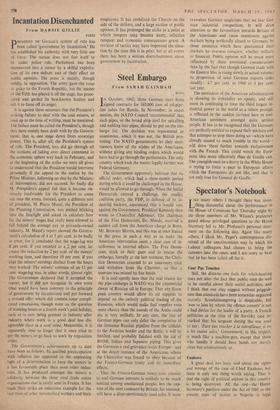Steel Embargo
From SARAH GA.INHAM
BONN
IN October, 1962, three German steel firms 'signed contracts for 163,000 tons of oil-pipe- line tubes for Russia. In November, in secret session, the NATO Council 'recommended' that such pipes, or the broad strip steel for spiralling and welding into pipes, should be put on the em- bargo list. The decision was represented as unanimous, which it was not, the British pro- testing. The NATO governments let their steel- masters know of the wishes of the Americans, without giving any binding orders which would have had to go through the parliaments. The only country which took the matter legally further was Federal Germany.
The Government apparently believed that its official order, which had a three-month period during which it could be challenged in the House, would be allowed to go through. When the Social Democrats entered a challenge, the smaller coalition party, the FDP, in defence of its in- dustrial backers, announced that it would vote against the Government. President Kennedy then wrote to Chancellor Adenauer. The chairman of the Free Democrats, Dr. Mende, received a sudden call from the American chargé in Bonn, Mr. Brewster Morris, and this was at once leaked to the press in such a way as to make the American intervention seem a clear case of in- terference in internal affairs. The Free Demo- crats stuck to their guns and to rescue the embargo, literally at the last moment, the Chris- tian Democrats resorted to an unsavoury trick and withdrew from the Chamber, so that a quorum was missed by five heads.
It is said openly here that the real reason for the pipe embargo in NATO was the commercial threat of Russian oil in Europe. That any Euro- pean country would allow its oil supplies to depend on the entirely political trading of the Russians, which would make fuel supplies even more chancy than the moods of the. Arabs could do, is very unlikely. In any case, the loss of German pipes can only delay the completion of the immense Russian pipeline from the oilfields to the Austrian border and the .Baltic; it will be finished, and probably finished with the aid of British, Italian and Japanese piping. This gives the Germans a real grievance inside Europe---and at the direct instance of the Americans, whom the Chancellor was forced to obey because of the Franco-German treaty and its immediate effects.
That the Franco-German treaty runs counter to real German interests is unlikely to be much noticed among uneducated people, but the cap- ture of the steel contracts by Britain, for instance, will have a disproportionately loud echo. It must reawaken German suspicions that we fear Ger- man industrial competition. It will draw attention to the favouritism towards Britain of the Americans and rouse resentment against markets being artificially closed to Germany by those countries which have guaranteed their markets by overseas conquest, whether military or financial. Public opinion will be much more influenced by these emotional considerations than by the fact that though German trade with the Eastern bloc is rising slowly in actual volume, its proportion of total German exports sinks steadily: 4.7 per cent. in 1960 to 4 per cent. last year.
The unwisdom of the American administration in showing its irritability so openly, and still more in continuing to treat the third largest in- dustrial power in the world as a minor protégé, is reflected in the sudden increase here in anti- American sentiment amongst quite serious people. It has to be recognised that the Germans are perfectly entitled to expand their markets and that attempts to stop them doing so—which have already caused so much trouble in the world— will drive them farther towards exclusiveness with the French. This could wreck the Euro- pean idea more effectively than de Gaulle can. The youngish-man-in-a-hurry in the White House is trying to force a pace in European affairs which the Europeans do not like, and that is not only true for General de Gaulle.














































 Previous page
Previous page